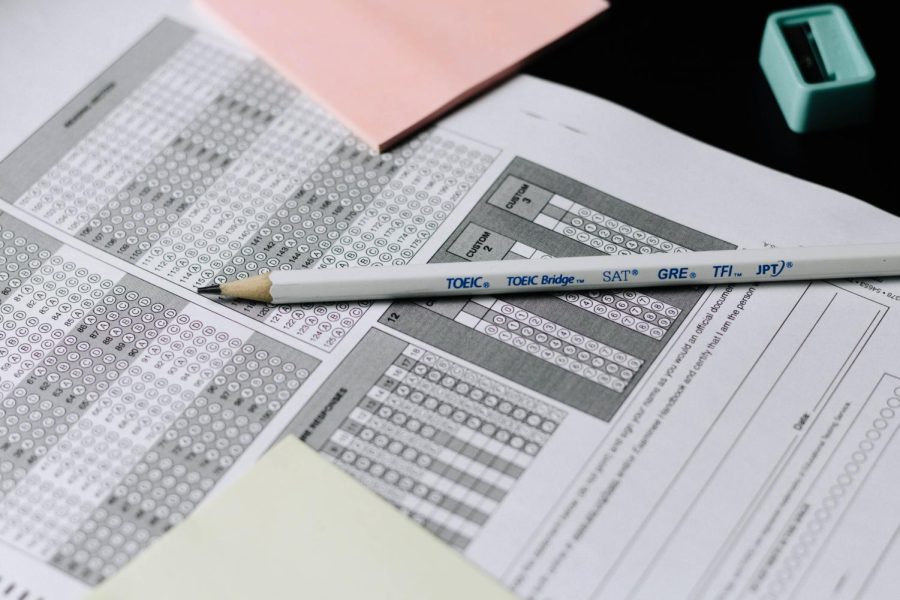Initial relief of canceled finals leads to larger questions
Students across New Trier rejoiced in the wake of the administration’s Jan. 4 decision to cancel first semester finals that would have taken place Jan. 18-20
After almost two years of remote and hybrid learning, many underclassmen would be having their first experience with traditional high school finals this winter. Combined with uncertainty surrounding COVID-19 and the future of next semester, students such as freshman Emily Booden felt the decision to eliminate the exams reduced a lot of anxiety.
“In practically all of my classes, teachers and students alike would be talking about finals,” said Booden. “I found all of the information about semester exams, such as time slots, dates, and how much they would affect my grade, to be completely overwhelming, given the current state of the pandemic.”
Concerns have been raised by some students, however, such as junior Ava Wineman, who were hoping to raise borderline grades through their exam scores.
“I was depending on the grade boost I would have potentially gotten from finals,” said Wineman. “Now that’s gone, so I have to somehow find another way to get a few of my grades over the border.”
Seniors specifically may be negatively impacted by the cancellation of finals, according to science teacher Nicole Hoefling.
“College grades are mostly made up of tests, so some of my students have voiced concerns about going to college or university,” said Hoefling. “They are stressed that they really haven’t had a lot of finals. My seniors are a little bit freaked out and don’t feel prepared for next year.”
In an email sent to NT families regarding finals, the school wrote that their decision was influenced by students worried about quarantining and subsequently missing class in the days leading up to finals.
While the administration has prohibited any cumulative assessments, other teachers have looked towards smaller projects and tests, which may be counterintuitive to the school’s original decision. Senior Josh Grossman found his new assignments to be comparable to his original finals.
“A lot of my teachers are giving work that is equally as stressful,” said Grossman. “We had a difficult final essay that was due on the 12th, but luckily my class protested and the deadline got pushed back.”
For some AP classes however, winter finals are essential for the process of preparing for AP exams in May. For her AP Biology class, Hoefling created a new test in order to provide her students with an opportunity to get a head start on reviewing material.
“We did a cumulative test to try and get my students to go ahead and study,” said Hoefling. “The test can only help, not hurt their grade, so there’s less stress. It’s good for AP students to have final exams which force them to study in the middle of the year.”
Other teachers, like Colby Vargas, in the social studies department, used their newfound time to focus on creating a smoother transition to next semester.
“Canceling finals has given me time to end the semester on a reflective note for a lot of my classes, which I think is a good bonus that I don’t usually have the time for,” said Vargas. “Maybe this will be a habit I’ll keep using in the future: to downplay the final even more, and have my students instead reflect on what they learned.”
The cancellation of finals has also made students wonder whether or not the school will take further action to address COVID-19. Senior Henry D’Souza said that the decision was influenced by the increasing number of students in quarantine, but eliminating exams does little to prevent the spread of the new omicron variant.
“I’m happy that I no longer have to stress about preparing for exams, but having us in the building that week defeats the purpose of a lot of the COVID reasons outlined by the school,” D’Souza said.
A significant portion of the current cases have come from gatherings outside the classroom, so having students in the building may be irrelevant to preventing more cases.
“I think canceling finals may increase the risk [of catching omicron] because people will be more inclined to hangout with friends and get exposed more easily,” Booden said.
Given the fact that the administration cannot prevent students from fraternizing outside of class, senior Piper Dooley said that the school should take additional measures to help everyone feel safer, specifically considering returning to remote learning.
“It’s great that finals are canceled, and I’m surprised that they [the administration] actually did it,” said Dooley. “It still feels like the school is only going halfway though.”








































